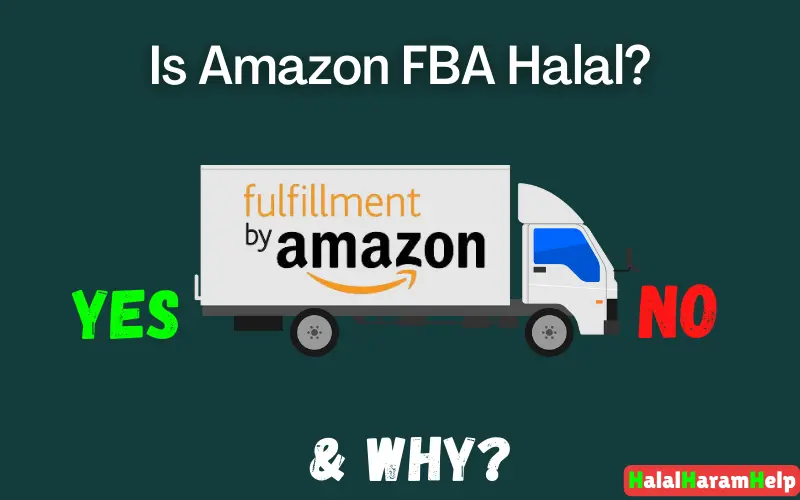In the bustling world of e-commerce, Amazon FBA (Fulfillment by Amazon) stands out as a lucrative opportunity for entrepreneurs.
However, for Muslim business owners, the question arises is Amazon FBA halal?
Navigating the intersection of modern business practices and Islamic principles can be challenging, but it’s essential for ensuring that our entrepreneurial ventures align with our faith.
Therefore, in this blog post, we will delve into the nuances of Amazon FBA, examining its practices through the lens of Islamic law to determine whether this popular business model meets the criteria of halal. So let’s get started.

Is Amazon FBA Halal?
Yes, Amazon FBA is halal, but with certain conditions and considerations.
For Muslims engaged in e-commerce, understanding the halal status of Amazon FBA (Fulfillment by Amazon) is crucial.
Amazon FBA is a service where Amazon handles the storage, packaging, and shipping of products on behalf of Amazon sellers. To determine its permissibility, we need to examine the core elements of the business model in light of Islamic principles.
Understanding Amazon FBA
Amazon FBA allows sellers to leverage Amazon’s vast logistics network to store and ship their products.
Sellers send their inventory to Amazon’s fulfillment centers, where Amazon takes care of storage, packaging, and shipping.
This convenience enables sellers to focus on other aspects of their business, such as marketing and product sourcing.
So here you can see that the business model is completely halal. But there are other things to consider which can make it haram, so let’s look at that.
You might also like knowing is Amazon stock halal.
Key Considerations for Halal Compliance:
1. Nature of Products: The products being sold must be halal. This means they should not contain haram (forbidden) items such as haram drinks, food, or any products derived from impermissible sources.
Additionally, items that promote immoral behavior or contradict Islamic values should be avoided.
2. Contracts and Agreements: The contractual terms with Amazon should be fair and transparent.
The agreement should not involve any elements of riba (usury), gharar (excessive uncertainty), or maysir (gambling). This includes ensuring that any fees or charges are clear and justified.
3. Business Ethics: The business practices must adhere to Islamic ethical standards. This includes honest marketing, fair pricing, and ensuring that the rights of consumers are respected.
Misleading advertisements or false claims about products would be considered unethical and thus impermissible.
4. Supply Chain Integrity: The entire supply chain should be free from involvement in haram activities.
This means ensuring that suppliers and logistics providers do not engage in unethical practices or deal with prohibited products.
Practical Steps for Ensuring Compliance
1. Product Verification: Conduct thorough checks to ensure that all products meet halal standards. This may involve obtaining halal certification for products where necessary.
2. Review Contracts: Carefully review all agreements with Amazon to ensure they comply with Islamic principles. Seek advice from a knowledgeable Islamic scholar or legal expert if needed.
3. Ethical Practices: Implement business practices that align with Islamic ethics, such as transparency in product descriptions, fair pricing, and excellent customer service.
4. Regular Audits: Conduct regular audits of your business processes and supply chain to ensure ongoing compliance with halal requirements.
Also see is affiliate marketing halal.
FAQs
Q. Is working in an Amazon warehouse halal?
A: Yes, working in an Amazon warehouse is generally considered halal, provided the work environment and duties do not involve handling or promoting haram products, and the job is performed ethically and honestly.
Q. Is it haram to be an Amazon affiliate?
A: No, it is not haram to be an Amazon affiliate as long as the products promoted are halal and the marketing practices are ethical and honest, adhering to Islamic principles.
Q. Is Amazon dropshipping halal?
A: Amazon dropshipping can be halal if the products being sold are halal, the transactions are transparent and honest, and the seller ensures that suppliers fulfill orders ethically and promptly.
Q. Is Fulfillment by Amazon halal?
A: Yes, Fulfillment by Amazon (FBA) is halal if the products are halal, the contracts are free from riba (usury) and excessive uncertainty, and the business practices adhere to Islamic ethics.
Also see is day trading halal if you’re in stock market.
Conclusion
In conclusion, Amazon FBA can be considered halal if certain conditions are met.
By ensuring that the products are halal, contracts are fair, and business practices align with Islamic ethics, Muslim entrepreneurs can confidently utilize Amazon FBA for their e-commerce ventures.
If you follow Islamic guidelines in products then Amazon FBA can be a great halal business model for you.


